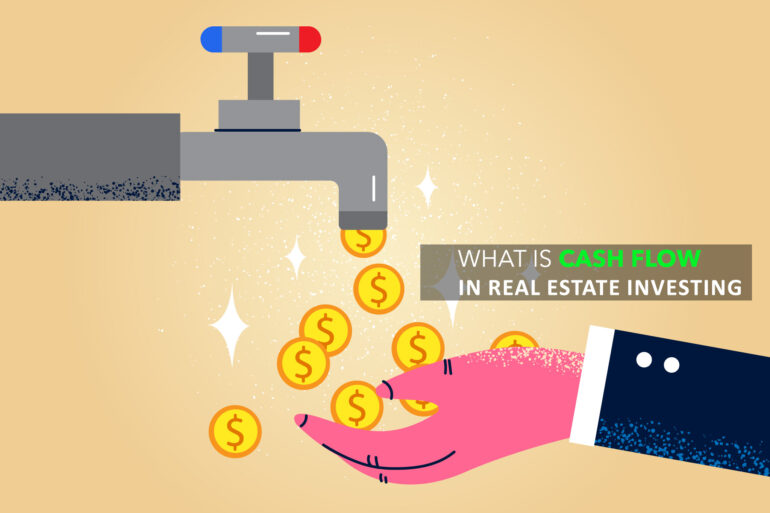What Is Cash Flow in Real Estate Investing
Investing in real estate may seem like a simple and safe way to generate passive income, but the truth is, it can be risky especially if you don’t know exactly what you’re doing. Big profit margins have become a thing of the past, as more people now invest in real estate and rent properties to other individuals.
In such a saturated market, what are the best options for new investors? What’s the secret to ensuring you get the highest returns on your investment? Cash flow is king, which is why it’s one of the most important aspects of any investment venture.
As a new investor, you must get familiar with this concept. In fact, this may go without saying, but cash flow is more important to some degree than whether or not you’re able to secure a great deal on an investment.
Here is why this is true.
What Is Cash Flow?
Cash flow is often used as a metric for real estate investments because it evaluates how much money a property will generate for you.
According to Investopedia, cash flow is the amount of cash available to a person, business, or other entity after paying all expenses. This term can be applied in many different contexts, but it typically refers to the amount of money left over after an individual or organization pays its bills.
Cash flow is an essential concept in accounting and budgeting as it represents the vital liquidity that allows a business or individual to continue operating. The term “cash flow” is also used in real estate investing to denote the inflow or outflow of cash associated with a property.
A negative cash flow indicates a loss of money while a positive cash flow means that money is being made on the property. Cash flow is often used as a metric for real estate investments because it evaluates how much money a property will generate for you.
The first step in figuring out what cash flow is for a property is to understand the income and expenses associated with that property. Income can come from rental payments, or other sources, like parking fees or vending machine income. Expenses are things, such as:
- Mortgage payments
- Insurance
- Utilities
- Property management fees
- Property taxes
- Maintenance costs
Cash flow is calculated by finding how much money comes in minus how much you have to spend on expenses.
How to Calculate Cash Flow
Be sure to factor in every expense you can think of. There could be some obscure item on your checklist that catches you off guard when you do the math.
To calculate cash flow, you need to start with two things: income and expenses. Both are usually figured on an annual basis, though you can calculate monthly or quarterly figures if that works better for your situation.
Your gross income should include rent and any utility bills, such as parking fees, pet fees, or anything else that you charge your tenants for.
In case you didn’t think you’d ever use math in real estate, here’s the formula:
Cash Flow = Gross Income – Expenses
Our online calculator (available for our premium subscribers) will help you determine the cash flow of your real estate investments. It takes into account the type of investment, length of the investment term, and the amount invested.
To calculate cash flow, you’ll need to account for all your costs associated with owning a rental property. These include:
- Mortgage payment (if applicable)
- Property taxes
- Bad tenants
- Insurance (homeowners and liability)
- Property management company costs
- Repairs and maintenance costs (this includes everything from lawn care to replacing appliances)
- Vacancy rate percentage
Calculating these costs is simple enough once you’re aware of them. Be sure to factor in every expense you can think of. There could be some obscure item on your checklist that catches you off guard when you do the math. In other words, don’t just take the seller’s word for it.
Net operating income (NOI) is a key indicator of whether or not a real estate investment will be profitable for an investor.
For example
You might have a tenant who pays $1,000 per month in rent. You might also have property taxes of $200 per month, insurance costs of $120 per month, and maintenance costs of $30 per month. The net operating income is the amount left over $730. Subtract the mortgage payment of $600, and you get a cash flow of $130 for the month or $1560 annually.
Your net income will be equal to what’s left over after all expenses have been deducted from gross income generated by renting out the space, which would include rent collected from tenants.
The amount of money left over after all expenses have been taken into account is called “net operating income.” Net operating income (NOI) is a key indicator of whether or not a real estate investment will be profitable for an investor.
For example
Let’s say your NOI is $5,000 per month. If it costs $3,000 per month to pay off your mortgage, that’s $2,000 in extra cash flow every month. After accounting for property tax and insurance costs of $1,000 (which vary depending on where you live), that leaves you with $1,000 in extra cash flow every month. That’s a cash flow of $12,000 per year!
Positive Cash Flow vs Negative Cash Flow
Cash flow is the lifeblood of any business, and your rental property is no exception.
Positive cash flow and negative cash flow are two terms you will hear frequently in real estate.
In general, positive cash flow means that the rental income that is generated by a property is greater than the expenses of operating the property. This includes mortgage payments, property taxes, insurance, maintenance costs, and any other expenses associated with owning a property. Negative cash flow occurs when there is not enough income to pay for expenses.
When it comes to real estate investments, a positive cash flow is ideal because it means that you are generating income from a property that can be used to pay down interest on the loan or pay off the loan entirely. A negative cash flow may cause your investment to go into foreclosure if you are not able to generate enough money to cover operating costs. You can learn about foreclosures in our hand curated educational section
The terms are important because lenders will typically lend more money on properties with positive cash flow than those with negative cash flow. This allows an investor purchasing a rental property to borrow more money and reduce the amount of capital they must use as an investment. To qualify for these larger loans, however, properties must have at least some positive cash flow.
Ways to Improve Your Rental Property’s Cash Flow
Cash flow is the lifeblood of any business, and your rental property is no exception. If you don’t have enough cash flow to cover your expenses, you could be forced to tap into your bank account or take out a loan.
Here are some ways to improve your rental property’s cash flow:
- Increase rents. Raising rent is one of the easiest ways to increase cash flow because it doesn’t require any capital investment on your part. However, it can be risky if you raise rents too high too quickly and cause tenants to move out before their lease terms expire.
- Reduce expenses. Another way to improve cash flow is by reducing expenses, such as utility bills and maintenance costs. You can do this by upgrading old appliances or installing energy-efficient ones in all of your units at once. This will help keep costs down for years to come while reducing how much you need to pay on those utility bills per month.
- Hire a property manager. A property manager can help keep track of all the details involved with renting out a multi-unit building so that you don’t have to worry about them yourself!
- Be sure to perform routine maintenance on the property and keep up with maintenance issues as soon as possible, so you can avoid emergency repairs that could cost more money than usual.
- Keep an eye on your utilities and bills so you don’t get stuck paying high utility bills that could cause a loss in profits for your business.
- Charge for utilities or other services that are usually included in rent — like washers and dryers or parking spaces. Therefore, tenants are paying for them directly instead of indirectly through their rent checks.
- Keep an eye on your vacancy rate. A vacancy is any time a unit is empty whether it’s for one day or one month. If the vacancy rate is too high, you may need to do some housekeeping on your rentals. Perhaps, making repairs or updating appliances or fixtures.
Benefits of Understanding Cash Flow
Cash flow is the lifeblood of any real estate investment analysis. Without it, you’ll be unable to make informed decisions about your business and fall into some very common traps.
Cash flow can tell you whether your property will produce a positive cash flow, even if the real estate market crashes. It can also tell you whether you’ll be able to cover all your expenses with rental income in any given month. Cash flow in real estate investing will show you:
- When to analyze cash flow (a short list).
- Where to find free resources for analyzing cash flow.
- How to analyze cash flow from the perspective of a lender.
- Why most investors neglect this imperative step, and how it can hurt them.
- How to compare different properties using cash flow analysis.
- How to use a property’s exit strategy — whether it’s selling, refinancing, or leasing out — to increase its value as an investment property.
- How to use the information provided by an exit strategy analysis to determine if the deal is worth pursuing.
- How to take advantage of tax breaks that are available for real estate investors.
Learn How to Make Better Real Estate Decisions
Cash flow is the key to success in any business, and investing in real estate is no different. Being aware of cash flow and how it relates to real estate will help you make better investment decisions.
Additionally, it helps you understand how you should use your cash flow in your monthly budget. The better your understanding of your finances and valuation, the sounder and more valuable your investment will be.








